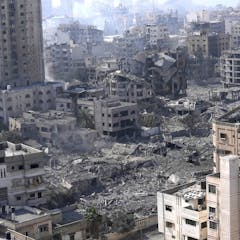
Articles sur Gaza
Affichage de 61 à 80 de 428 articles

Maps can shape how we see conflict.

Catherine Colonna’s report has been angrily rejected by the Israeli government.

Ontario’s Strengthening Accountability and Student Supports Act threatens to undermine university autonomy, and could serve to censor critical thinking and dissent on campuses.

Jordan’s foreign policy has landed the kingdom in hot water.

Nuclear proliferation is gathering pace as global tensions rise.

Israel continues to restrict international journalists access to Gaza, and Palestinian reporters are being killed.

The roots of today’s Israel-Palestine crisis can be traced back to colonial power dealings during World War I – of which the Gallipoli campaign and Anzac legend are an integral part.

AI is enabling a huge number of decisions about who to target. They are not always the right ones.

In 2015, I saw Jewish and Muslim students forge a set of group agreements so they could dialogue on the Middle East conflict. Initiatives like this or a ‘Semester in Dialogue’ program are promising.

Israel’s latest missile strike on Iran may be more a face-saving exercise aimed at satisfying members of its coalition government than a true escalation of hostilities.

A selection of our coverage of the conflict in Gaza from the past fortnight.

Experts say mainstream media coverage of the war in Gaza is severely skewed — with Palestinian voices getting stifled.

In recent weeks, as thousands died and the threat of famine settled over Gaza, the relationship Israel and its western allies had started to fracture. Iran’s attack appears likely to change that.

Iran’s attack on Israel may have failed, but its timing was orchestrated to create maximum division.

A long-running conflict between adversaries Israel and Iran fell short of open confrontation – until both countries took more direct aim at each other.

Revelations by an investigative journalist that Israel is using AI to identify and target suspected Hamas members have shone a light on a frightening new aspect of warfare.

Tehran has warned that no Israeli embassy is safe following deadly bombing of its mission in Damascus.

Refugee programs in Canada have always been politicized, but more so in recent years, evidenced in discrepancies between programs for refugees from Gaza and Sudan and those from Ukraine.

The age of AI warfare has arrived – and it’s not looking good.

The Palestinian enclave faces an interconnected series of crises that will amplify the human costs of conflict even when the bombing ends.
